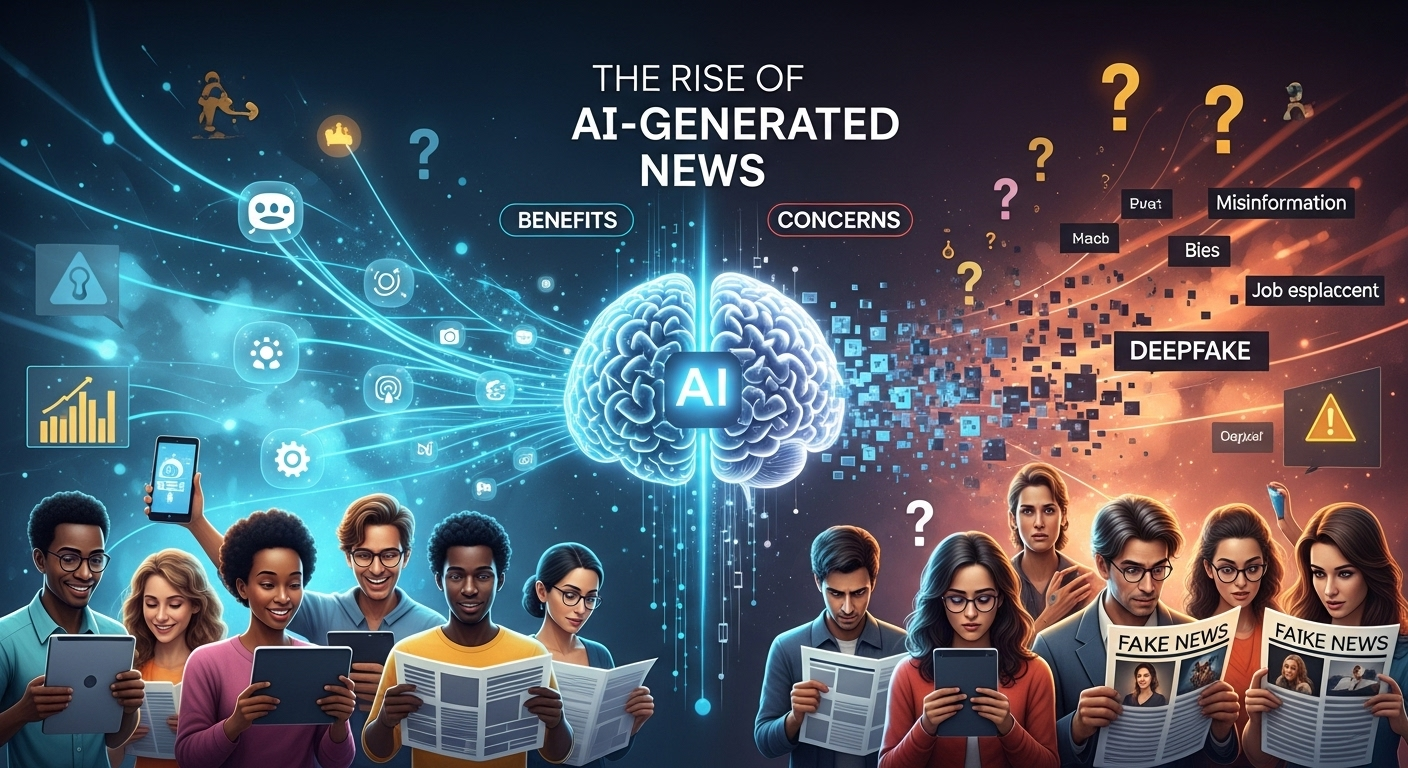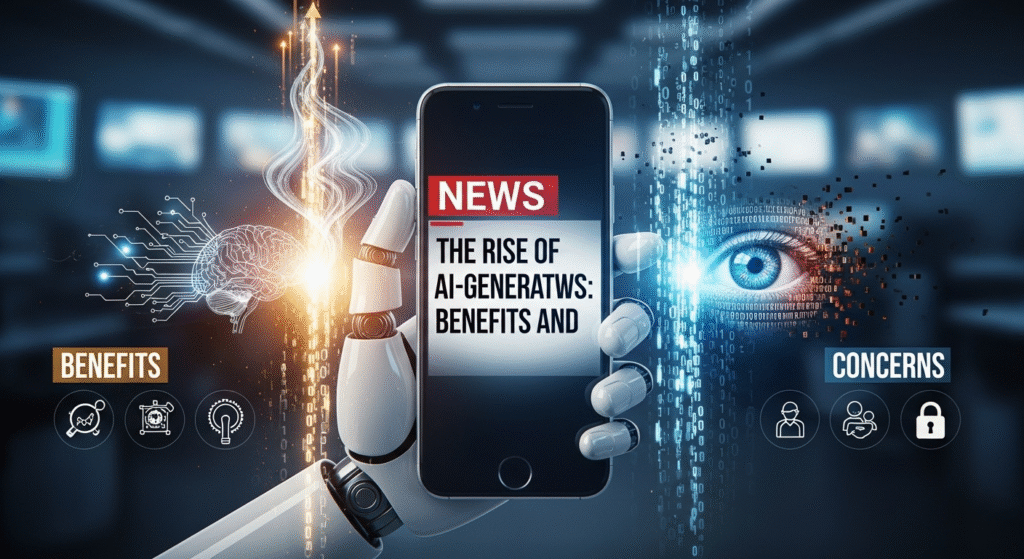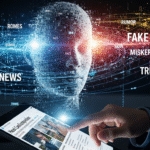Okay, let’s talk about something that’s been buzzing around my head (and probably yours too): AI-generated news. It’s a topic that manages to be both incredibly exciting and slightly terrifying, all at the same time. Think about it – algorithms churning out news articles faster than you can say “breaking news.” It’s here, it’s happening, and it’s changing the media landscape in ways we’re only beginning to understand.
I remember the first time I really considered the implications. It was a few years back, and I was working on a project involving natural language processing. The idea of AI writing articles seemed like something out of a sci-fi movie. Now, it’s reality. And, I’ve got to admit, this part fascinates me. The sheer potential for efficiency is staggering.
The Allure of Speed and Scale

The main benefit, the one that’s shouted from the rooftops, is speed. Traditional journalism takes time. Research, interviews, writing, editing – it’s a process. AI can bypass much of that, generating reports on data-heavy topics, like financial results or sports scores, almost instantaneously. Imagine the possibilities! Real-time updates, personalized news feeds, and a constant stream of information. Businesses, for example, can benefit a lot from the rise of AI, more on this you can read here.
And scale? Well, that’s another biggie. News organizations could potentially cover far more events and issues than ever before. Think of hyperlocal news, reporting on every little thing happening in every small town. It’s a level of coverage that would be practically impossible with human reporters alone. But is more always better? That’s the question that keeps nagging at me.
The Ethical Minefield
Because here’s the thing: while the benefits are tantalizing, there’s a whole ethical minefield to navigate. Accuracy, for one. AI is only as good as the data it’s trained on. If that data is biased or incomplete, the resulting news articles will be too. And that’s where things get tricky.
Bias in AI is a huge issue, and it’s not always obvious. It can creep in subtly, reflecting the prejudices and assumptions of the people who create the algorithms. So, what happens when that bias gets amplified and disseminated through AI-generated news? It’s a scary thought.
But it doesn’t stop there. What about plagiarism? Copyright infringement? AI models are trained on vast amounts of text, and it’s not always clear where the line is drawn between learning and copying. It’s a legal and ethical gray area, to say the least.
The Human Element
And then there’s the human element. Journalism isn’t just about reporting facts; it’s about context, analysis, and understanding. It’s about asking tough questions, holding power accountable, and telling stories that matter. Can AI really do that? I’m not so sure.
You might be wondering, “But can’t AI be used as a tool to help journalists, rather than replace them?” Absolutely! That’s probably the most promising path forward. AI can handle the grunt work – sifting through data, generating basic reports – freeing up human journalists to focus on more complex and nuanced stories. But, that requires careful management and a clear understanding of AI’s limitations. If the goal is to write games news, you could find some information here.
Navigating the Future of News
The frustrating thing about this topic is that there are no easy answers. AI-generated news is evolving so rapidly that it’s hard to keep up. But it’s crucial that we do. We need to have a serious conversation about the ethical implications, the potential risks, and the best ways to harness this technology for good.
I keep coming back to this point because it’s crucial: The future of news isn’t about humans versus machines. It’s about humans and machines, working together to create a more informed and engaged society.
FAQ: The Rise of AI-Generated News
How can I tell if a news article was written by AI?
That’s the million-dollar question, isn’t it? It’s getting harder and harder to tell the difference. Look for generic writing, lack of original insights, and an over-reliance on data. AI-generated articles often lack the nuance and storytelling that a human journalist brings to the table. But honestly, in the future, it may become nearly impossible to distinguish without specific disclosures.
Why are people so concerned about AI-generated news?
Well, a few reasons. The potential for bias and misinformation is a big one. If AI is trained on flawed data, it can perpetuate harmful stereotypes and spread false information. There’s also the risk of job displacement for journalists. And the simple fear of a world where news is created by algorithms, rather than humans who understand the complexities of the world. All valid points, I think. I even explored the rise of AI with Azure as a transformation, read more about that.
Can AI-generated news actually be beneficial?
Absolutely! It can automate repetitive tasks, freeing up journalists to focus on more in-depth reporting. It can also provide real-time data analysis and personalized news feeds. The key is to use AI responsibly and ethically, with human oversight and a commitment to accuracy and fairness.
What measures are being taken to ensure the accuracy of AI-generated news?
This is an evolving area. Some organizations are developing AI models that are specifically trained to detect and correct errors in AI-generated content. Others are implementing human review processes to ensure accuracy and fairness. It’s a constant arms race, though, as AI technology continues to advance.
How does The Rise of AI-Generated News impact trust in media?
That’s a critical concern. If people can’t trust the news they’re reading, it erodes faith in journalism as a whole. Transparency is key. News organizations need to be upfront about their use of AI and take steps to ensure the accuracy and ethical integrity of their content. Otherwise, trust will be incredibly difficult to maintain.
So, there you have it. A somewhat rambling, but hopefully insightful, look at the rise of AI-generated news. It’s a complex and fascinating topic, and one that we’ll be grappling with for years to come. What I hope is to see the collaboration between humans and AI to be seamless, and bring more insightful truth in today’s world.



